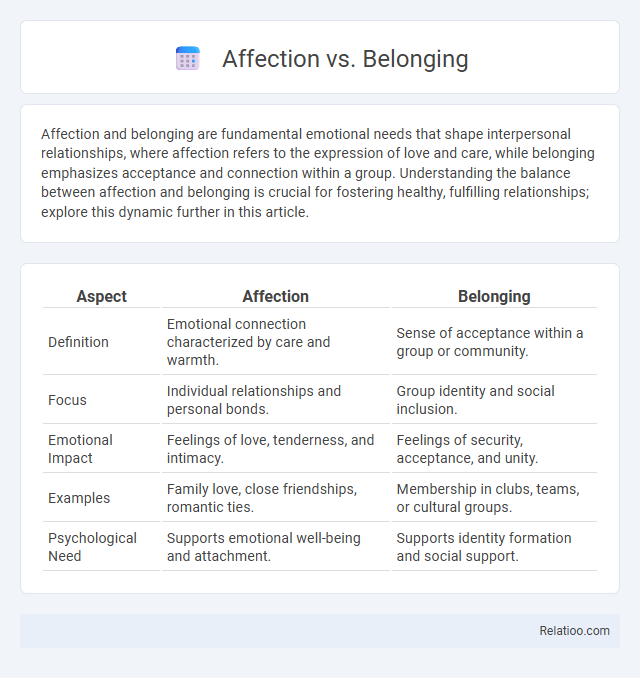Affection and belonging are fundamental emotional needs that shape interpersonal relationships, where affection refers to the expression of love and care, while belonging emphasizes acceptance and connection within a group. Understanding the balance between affection and belonging is crucial for fostering healthy, fulfilling relationships; explore this dynamic further in this article.
Table of Comparison
| Aspect | Affection | Belonging |
|---|---|---|
| Definition | Emotional connection characterized by care and warmth. | Sense of acceptance within a group or community. |
| Focus | Individual relationships and personal bonds. | Group identity and social inclusion. |
| Emotional Impact | Feelings of love, tenderness, and intimacy. | Feelings of security, acceptance, and unity. |
| Examples | Family love, close friendships, romantic ties. | Membership in clubs, teams, or cultural groups. |
| Psychological Need | Supports emotional well-being and attachment. | Supports identity formation and social support. |
Understanding Affection: Definition and Significance
Understanding affection involves recognizing it as an emotional expression of warmth, care, and attachment that fosters personal connections and psychological well-being. Affection plays a critical role in relationships by promoting trust, empathy, and social bonding, which are essential for mental health and emotional resilience. Distinguishing affection from belonging highlights its intimate and direct nature, while belonging refers more broadly to the acceptance and inclusion within a group or community.
What Does Belonging Really Mean?
Belonging means being accepted and valued within a group where individuals feel safe to express their true selves, fostering deep emotional connections and mutual respect. Unlike affection, which involves warmth and care typically between individuals, belonging emphasizes a shared identity and community membership that satisfies the fundamental human need for social inclusion. True belonging transcends surface-level attachments and affections by creating a sense of purpose, loyalty, and psychological security within a collective.
Key Differences Between Affection and Belonging
Affection involves emotional warmth and care expressed through physical or verbal gestures, focusing on individual connections and feelings of love or fondness. Belonging refers to the sense of being accepted and integrated within a group or community, emphasizing social inclusion and identity. The key difference lies in affection's focus on interpersonal emotional bonds, while belonging centers on collective acceptance and social affiliation.
Psychological Impact of Affection
Affection fosters emotional security and boosts mental well-being by triggering the release of oxytocin, which reduces stress and enhances happiness. Unlike mere belonging, which satisfies social inclusion, affection creates deep psychological bonds that promote resilience and self-worth. Your sense of emotional fulfillment grows stronger when affectionate connections are prioritized alongside the need for belonging.
The Role of Belonging in Mental Health
Belonging plays a crucial role in mental health by fostering a sense of acceptance and connection that reduces feelings of loneliness and anxiety. Unlike affection, which centers on emotional warmth and care, belonging emphasizes integration within a community or group, enhancing self-esteem and resilience. Strong social bonds linked to belonging have been shown to lower risks of depression and promote overall psychological well-being.
How Affection Influences Relationships
Affection plays a crucial role in strengthening your relationships by fostering emotional intimacy and trust between individuals. When affection is consistently expressed, it enhances feelings of security and acceptance, which are essential for a genuine sense of belonging. This emotional connection rooted in affection distinguishes it from mere belonging, as affection directly nurtures deeper bonds and long-term relational satisfaction.
Belongingness in Social Groups and Communities
Belongingness in social groups and communities is a fundamental human need that influences mental health, social identity, and overall well-being. It fosters trust, cooperation, and shared purpose, enhancing group cohesion and individual self-esteem. Research in psychology highlights belongingness as crucial for reducing feelings of loneliness and promoting social support networks essential for emotional resilience.
Affection vs Belonging in Childhood Development
Affection and belonging are fundamental components in childhood development that influence emotional well-being and social skills. Affection provides children with feelings of security and acceptance through physical touch and expressions of love, while belonging fosters a sense of community and identity within peer groups and family structures. A balanced interplay between affection and belonging supports healthy attachment, resilience, and the development of interpersonal relationships during formative years.
Ways to Foster Affection and Belonging
Fostering affection involves consistent expressions of care and emotional support, such as verbal affirmations, physical touch, and active listening, which deepen personal connections. Creating a sense of belonging requires inclusive environments where individuals feel accepted, valued, and connected through shared experiences, group activities, and mutual respect. Encouraging open communication, empathy, and collaborative participation strengthens both affection and belonging, enhancing overall emotional well-being and social cohesion.
Striking a Balance: Integrating Affection and Belonging
Striking a balance between affection and belonging involves fostering emotional connections that provide both individualized warmth and a sense of community identity. Integrating affection ensures personal validation and emotional support, while belonging reinforces social inclusion and shared purpose. Effective relationships cultivate environments where affection enhances group cohesion without diminishing individual significance.

Infographic: Affection vs Belonging
 relatioo.com
relatioo.com